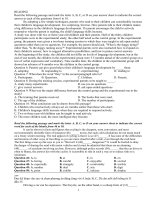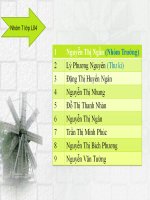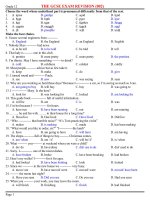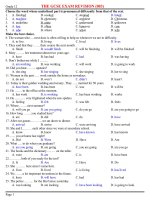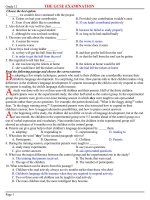GCSE 039
Bạn đang xem bản rút gọn của tài liệu. Xem và tải ngay bản đầy đủ của tài liệu tại đây (81.32 KB, 6 trang )
SƠ GD&ĐT VINH PHUC
TRƯƠNG THPT LIÊN SƠN
(Đề thi gồm: 05 trang)
ĐỀ KTCL ƠN THI THPT QUỐC GIA NĂM 20182019
Mơn: TIẾNG ANH – ĐỀ SỐ 039
Thời gian làm bài: 60 phút, không kể thời gian phát
đề
Ho va tên thi sinh:……………………………………………………………………. SBD:…………………………
Mark the letter A, B, C, or D on your answer sheet to indicate the word or phrase that is
OPPOSITE in meaning to the underlined part in each of the following questions.
Question 01: The aircraft carrier is indispensable in naval operations against sea or shore based
enemies.
A. novel
B. unnecessary
C. exotic
D. vital
Question 02: People are now far more materialistic than their predecessors years ago.
A. monetary
B. greedy
C. object-oriented D. spiritual
Read the following passage and mark the letter A, B, C or D on your answer sheet to indicate
the correct word or phrase that best fits each of the numbered blanks.
You will make the interview process easier for the employer if you volunteer relevant
information about yourself. Think about how you want to present your (03)_________, experiences,
education, work style, skills, and goals. Be prepared to supplement all your answers with examples
that support the statements you make. It is also a good idea to review your résumé with a critical
eye and identify areas that an employer might see as limitations or want further information.
Think about how you can answer difficult questions (04)_________ and positively, while keeping each
answer brief.
An interview gives the employer a (05)_________ to get to know you. While you do want to
market yourself to the employer, answer each question with an honest response.
Never say anything negative about past experiences, employers, or courses and professors. Always
think of something positive about an experience and talk about that. You should also be
(06)_________. If you are genuinely interested in the job, let the interviewer know that.
One of the best ways to show you are interested in a job is to demonstrate that you have
researched the organization prior to the interview. You can also (07)_________ interest by asking
questions about the job, the organization, and its services and products.
Question 03:
A. pressures
B. practices
C. promotions
D. strengths
Question 04:
A. accurately
B. hardly
C. rightly
D. sharply
Question 05:
A. change
B. way
C. chance
D. practice
Question 06:
A. enthusiasm
B. enthusiastic
C. enthusiast
D. enthusiastically
Question 07:
A. show
B. appear
C. conceal
D. cover
Mark the letter A, B, C, or D on your answer sheet to indicate the sentence that best combines
each pair of sentences in the following questions.
Question 08: He was successful because he was determined to pursue personal goals. He was not
talented.
A. In addition to his determination, his talent ensured his success in pursuing his goals.
B. His determination to pursue personal goals made him successful and talented.
C. It was his determination to pursue personal goals, not talent, that contributed to his
success.
D. His success lay in his natural ability, not in his determination to pursue personal goals.
Question 09: There was a serious flood. All local pupils couldn’t go to school on that day.
A. The serious flood prevented all local pupils not go to school on that day.
B. The serious flood hindered all local pupils from going to school on that day.
C. The serious flood made all pupils from not going to school on that day.
D. The serious flood caused all local pupils not go to school on that day.
Mark the letter A, B, C, or D on your answer sheet to indicate the sentence that is closest in
meaning to each of the following questions.
Question 10: I would willingly have lent you the money myself if only I’d known you needed it.
A. I would lend you the money willingly if I were convinced that you really required it.
B. As I realized just how necessary the loan was to you, I naturally lent you what you
needed.
C. Had I realized that you were in need of such a loan, I would gladly have lent it to you
myself.
D. I was under no obligation to offer you a loan, but nevertheless did so gladly.
Question 11: The scene is set in Normandy, but most of the characters in this novel are Londoners.
A. In the novel, the action moves backwards and forwards between Normandy and London.
B. The story is about Normandy, but the leading characters are all Londoners.
C. The main characters in the novel are Londoners on a sightseeing holiday in Normandy.
D. In this novel, the story takes place in Normandy but the majority of the characters are
from London.
Question 12: We got caught in a traffic jam so we were among the last to arrive.
A. Most people got there before us as we were held up by the traffic.
B. The late arrivers all put the blame on the heavy traffic.
C. The traffic was so heavy that nearly everyone arrived late.
D. There was such a congestion on the roads that I thought we never would get there.
Mark the letter A, B, C, or D on your answer sheet to indicate the word or phrase that is
CLOSEST in meaning to the underlined part in each of the following questions.
Question 13: When Susan invited us to dinner, she really showed off her culinary talents. She
prepared a feast - a huge selection of dishes that were simply mouth-watering.
A. having to do with food and cooking
B. relating to medical knowledge
C. involving hygienic conditions and diseases
D. concerning nutrition and health
Question 14: The works of the English theoretical physicist and cosmologist Stephen Hawking
helped pave the way for the framework of general relativity and theoretical prediction of black
holes dynamics and mechanics.
A. terminate
B. lighten
C. initiate
D. prevent
Mark the letter A, B, C or D on your answer sheet to indicate the underlined part needs
correction.
Question 15: A professor of economy and history at our university developed a new theory of the
relationship between historical events and financial crises.
A. economy
B. developed
C. between
D. financial crises
Question 16: The Mediterranean, a large sea surrounded by land, is a mile depth on the average
and more than 2000 miles long.
A. surrounded by land
B. depth
C. on the average
D. 2000 miles long
Question 17: If you record people spoke a disappearing language, you can keep important
information about both the language and its speaker.
A. spoke
B. disappearing
C. keep
D. about
Mark the letter A, B, C or D on your answer sheet to indicate the most suitable response to
complete each of the following exchanges.
Question 18: Ken and Tom are high-school students. They are discussing where their study group
will meet. Ken: “Where is our study group going to meet next weekend?” – Tom: “_____________.”
A. Studying in a group is great fun.
B. We are too busy on weekdays.
C. Why don’t you look at the atlas?
D. The library would be best.
Question 19: Peter: “Do you think that we should use public transportation to protect our
environment?” – Jerry: “______________.”
A. Yes, it’s an absurd idea.
B. There’s no doubt about it.
C. Of course not. You bet.
D. Well, that’s very surprising!
Read the following passage and mark the letter A, B, C, or D on your answer sheet to indicate
the correct answer to each of the questions.
COMEDIANS
What drives moderately intelligent persons to put themselves up for acceptance or
disparagement? In short, what sort of individual wants to be a comedian? When we hear the very
word, what does the label suggest? Other professions, callings and occupations attract separate
and distinct types of practitioner. Some stereotypes are so familiar as to be cheaply laughable
examples from the world of travesty, among them absent-minded professors, venal lawyers,
gloomy detectives and cynical reporters. But what corny characteristics do we attribute to
comedians? To a man or woman, are they generally parsimonious, vulgar, shallow, arrogant,
introspective, hysterically insecure, smug, autocratic, amoral, and selfish? Read their superficial
stories in the tabloids and so they would appear.
Rather than look at the complete image, perhaps we need to explore the initial motives
behind a choice of career. Consider first those who prefer a sort of anonymity in life, the ones
who’d rather wear a uniform. The psychological make-up of individuals who actively seek to resign
their individuality is apparent among those who surrender to the discipline of a military life. The
emotional and intellectual course taken by those who are drawn to anonymity is easily observed
but not easily deflected. They want to be told what to do and then be required to do it over and
over again in the safety of a routine, often behind the disguises of a number of livery. If their egos
ache with the need for recognition and praise, it’s a pain that must be contained, frustrated or
satisfied within the rut they occupy. The mere idea of standing up in front of an audience and
demanding attention is abhorrent.
Nor will we find our comics among the doormats and dormice, the meek. There’s precious
little comedy in the lives of quiet hobbyists, bashful scholars, hermits, anchorites and recluses, the
discreet and the modest, ones who deliberately select a position of obscurity and seclusion.
Abiding quietly in this stratum of society, somewhere well below public attention level, there is
humour, yes, since humour can endure in the least favourable circumstances, persisting like lichen
in Antarctica. And jokes. Many lesserknown comedy writers compose their material in the secret
corners of an unassuming existence. I know of two, both content to be minor figures in the civil
service, who send in topical jokes to radio and TV shows on condition that their real names are not
revealed.
In both cases I've noticed that their comic invention, though clever, is based upon wordplay,
puns and similar equivoques, never an aggressive comic observation of life. Just as there may be a
certain sterility in the self-effacement of a humble life, so it seems feasible that the selection
process of what’s funny is emasculated before it even commences. If you have no ginger and snap
in your daily round, with little familiarity with strong emotions, it seems likely that your sense of
fun will be limited by timidity to a simple juggling with language.
If the comedian’s genesis is unlikely to be founded in social submission, it’s also improbable
among the top echelons of our civilisation. Once again, humour can be found among the majestic.
Nobles and royals, statesmen and lawmakers, have their wits. Jokes and jokers circulate at the
loftiest level of every advanced nation, but being high-born seems to carry no compulsion to make
the hoi polloi laugh. Some of our rulers do make us laugh but that’s not what they’re paid to do.
And, so with the constricted comedy of those who live a constricted life, which amuses them may
lack the common touch.
Having eliminated the parts of society unlikely to breed funnymen, it’s to the middle ranks
of humanity, beneath the exalted and above the invisible, we must look to see where comics come
from and why. And are they, like nurses and nuns, called to their vocation? As the mountain calls to
the mountaineer and the pentameter to the poet, does the need of the mirthless masses summon
forth funsters, ready to administer relief as their sole raison d’etre? We’ve often heard it said that
someone’s a ‘born comedian’ but will it do for all of them or even most of them? Perhaps we like to
think of our greatest jesters as we do our greatest painters and composers, preferring to believe
that their gifts are inescapably driven to expression. But in our exploration of the comedy mind,
hopefully finding some such, we are sure to find some quite otherwise.
[Source: PROFICIENCY TESTBUILDER 4th Edition, Macmillan, 2013]
Question 20: In the fourth paragraph, the writer criticises the kind of comedy he describes for its lack
of_________
A. spirit.
B. originality.
C. sophistication.
D. coherence.
Question 21: What does the writer wonder in the last paragraph?
A. whether comedians can be considered great in the way that other people in the arts can
B. whether people’s expectations of comedians are too high
C. whether comedians realise how significant they are in the lives of ordinary people
D. whether it is inevitable that some people will become comedians
Question 22: What does the writer imply about comedians in the first paragraph?
A. People in certain other professions generally have a better image than them.
B. It is harder to generalise about them than about people in other professions.
C. They often cannot understand why people make negative judgements of them.
D. It is possible that they are seen as possessing only negative characteristics.
Question 23: The writer says that people at the top of society_________
A. are unaware of how ridiculous they appear to others.
B. would not be capable of becoming comedians even if they wanted to.
C. take themselves too seriously to wish to amuse anybody.
D. have contempt for the humour of those at lower levels of society.
Question 24: Which word/phrase can be a substitution for “the hoi polloi”?
A. the elite
B. the mass media
C. ordinary people D. the showbitz
Question 25: The writer says in the third paragraph that shy people_________
A. fear that what they find humorous would not amuse others.
B. are capable of being more humorous than they realise.
C. may be able to write humorous material but could not perform it.
D. do not get the recognition they deserve even if they are good at comedy.
Question 26: What does the writer say about people who wear uniforms?
A. The desires they have are never met when they are at work.
B. They are more aware of their inadequacies than others may think.
C. They criticise performers for craving attention.
D. It is unusual for them to break their normal patterns of thought.
Mark the letter A, B, C, or D on your answer sheet to indicate the correct answer to each of the
following questions.
Question 27: It’s no longer possible to argue that crime is__________ with unemployment.
A. connecting
B. connect
C. unconnected
D. disconnected
Question 28: The authorities have shown no signs of__________ to the kidnappers’ demands.
A. standing up
B. bringing about
C. getting down
D. giving in
Question 29: Many of the beautiful buildings in our cities__________ by exhaust gases from cars and
factories. We must do something to stop this.
A. were destroyed B. are destroyed
C. are being destroyed D. have been destroyed
Question 30: Residents were warned not to be extravagant with water, __________ the low rainfall
this year.
A. in view of
B. with a view to
C. regardless of
D. irrespective of
Question 31: That play was__________ for her to see again.
A. interesting enough
B. too interesting
C. enough interesting D. so interesting
Question 32: His wife is a terrible snob. She__________ almost all his friends because they have north
country accents.
A. looks up to
B. looks forward to
C. looks out on
D. looks down on
Question 33: Upon returning from the class, __________.
A. a letter was found in the mail box
B. a letter was in the mail box
C. he found a letter from the mail box
D. the mail box had a letter in it
Question 34: All three TV channels provide extensive__________ of sporting events.
A. broadcast
B. network
C. coverage
D. vision
Question 35: According to the conditions of my scholarship, after finishing my degree, __________.
A. the university will employ me
B. my education will be employed by the university
C. I will be employed by the university D. employment will be given to me by the university
Question 36: There are many__________ in our library.
A. old American interesting history books B. interesting old American history books
C. interesting American old history books D. American interesting old history books
Question37: Those letters__________ now. You can do the typing later.
A. need to type
B. need typing
C. needn’t be typing
Question38: The more he tried to explain, __________ we got.
A. the much confused B. the many confusing C. the more confusing
D. needn’t be typed
D. the more confused
Mark the letter A, B, C, or D on your answer sheet to indicate the word whose underlined part
differs from the other three in pronunciation in each of the following questions.
Question 39:
A. kissed
B. washed
C. advertised
D. slipped
Question 40:
A. casebook
B. briefcase
C. suitcase
D. purchase
Read the following passage and mark the letter A, B, C, or D on your answer sheet to indicate
the correct answer to each of the questions.
TRACKING THE SNOW LEOPARD
“When a snow leopard stalks its prey among the mountain walls, it moves softly, slowly,”
explains Indian biologist Raghunandan Singh Chundawat, who has studied the animal for years. “If
it knocks a stone loose, it will reach out a foot to stop it from falling and making noise.” One might
be moving right now, perfectly silent, maybe close by. But where? And how many are left to see?
Best known for its spotted coat and long distinctive tail, the snow leopard is one of the
world’s most secretive animals. These elusive cats can only be found high in the remote,
mountainous regions of central Asia. For this reason, and because they hunt primarily at night,
they are very rarely seen.
Snow leopards have been officially protected since 1975, but enforcing this law has proven
difficult. Many continue to be killed for their fur and body parts, which are worth a fortune on the
black market. In recent years, though, conflict with local herders has also led to a number of snow
leopard deaths. This is because the big cats kill the herders’ animals, and drag the bodies away to
eat high up in the mountains.
As a result of these pressures, the current snow leopard population is estimated at only
4,000 to 7,000, and some fear that the actual number may already have dropped below 3,500. The
only way to reverse this trend and bring these cats back from near extinction, say conservationists,
is to make them more valuable alive than dead.
Because farming is difficult in Central Asia’s cold, dry landscape, traditional cultures depend
mostly on livestock (mainly sheep and goats) to survive in these mountainous regions. At night,
when snow leopards hunt, herders’ animals are in danger of snow leopard attacks. Losing only a
few animals can push a family into desperate poverty. “The wolf comes and kills, eats, and goes
somewhere else,” said one herder, “but snow leopards are always around. They have killed one or
two animals many time. Everybody wanted to finish this leopard.”
To address this problem, local religious leaders have called for an end to snow leopard
killings, saying that these wild animals have the right to exist peacefully. They’ve also tried to
convince people that the leopards are quite rare and thus it is important to protect them. Financial
incentives are also helping to slow snow leopard killings. The organization Snow Leopard
Conservancy–India has established Himalayan Homestays, a program that sends visitors to the
region to herders’ houses. For a clean room and bed, meals with the family, and an introduction to
their culture, visitors pay about ten U.S. dollars a night. Having guests once every two weeks
through the tourist season provides the herders with enough income to replace the animals lost to
snow leopards. In addition, Homestays helps herders build protective fences that keep out snow
leopards. The organization also conducts environmental classes at village schools and trains
Homestays members as nature guides, available for hire. In exchange, the herders agree not to kill
snow leopards.
In Mongolia, a project called Snow Leopard Enterprises (SLE) helps herder communities
earn extra money in exchange for their promise to protect the endangered cat. Women in
Mongolian herder communities make a variety of products—yarn for making clothes, decorative
floor rugs, and toys—using the wool from their herds. SLE buys these items from herding families
and sells them abroad. Herders must agree to protect the snow leopards and to encourage
neighbors to do the same.
The arrangement increases herders’ incomes by 10 to 15 percent and “elevates” the status
of the women. If no one in the community kills the protected animals over the course of a year, the
program members are rewarded with a 20 percent bonus in addition to the money they’ve already
made. An independent review in 2006 found no snow leopard killings in areas where SLE operates.
Today the organization continues to add more communities.
Projects like the Homestays program in India and SLE’s business in Mongolia are doing well,
though they cover only a small part of the snow leopard’s homeland, they make the leopards more
valuable to more people each year. If these programs continue to do well, the snow leopard may
just have a figting chance.
Question 41: Which of these is NOT true about the Himalayan Homestays program?
A. The organization helps herders to build fences.
B. Herders provide accommodation to guests.
C. Some herders work as nature guides.
D. Visitors pay $10 a week to stay at a herder’s house.
Question 42: The purpose of the projects mentioned is_________.
A. to persuade herders to live on eco-tourism not raising animals
B. to elevate the status of the women in the communities
C. to increase the population of snow leopards in wildlife reserves
D. to make local people have a sustainable life to protect snow leopards
Question 43: The phrase “this trend” in paragraph 4 refers to_________.
A. the fall in the snow leopard population B. the pressures caused by the black market
C. increasing conflict with the herders
D. the opinions of conservationists
Question 44: What is the main idea of the third paragraph?
A. Local herders are uncooperative in attempts to save snow leopards.
B. The snow leopard’s endangerment is due to in part to the black market.
C. Snow leopards are killed for their fur and body parts.
D. It is difficult to enforce the laws made to protect the snow leopard.
Question 45: The word “address” in in paragraph 6 can be replaced by_________.
A. solve
B. locate
C. discuss
D. change
Question 46: Why is the Mongolian women's status in the community “elevated”?
A. They can encourage their neighbours.
B. They are saving money for the snow leopards.
C. They are earning money for the community.
D. They are living higher up in the mountain.
Question 47: According to conservationists, what is the best way to save the snow leopard?
A. Create a nature park where they can be free
B. Move herders away from where the snow leopard lives
C. Pass laws to punish people who kill snow leopards for their fur
D. Make people recognize the value of living snow leopards.
Question 48: The word “bodies” in paragraph 3 refers to_________.
A. the big cats
B. snow leopards
C. local herders D. the herders’ animals
Mark the letter A, B, C, or D on you answer sheet to indicate the word that differs from the rest
in the position of the main stress in each of the following questions.
Question 49:
A. suspicious
B. marvelous
C. physical
D. argument
Question 50:
A. spaciousness
B. solicitor
C. consequence D. separately
_________THE END_________

